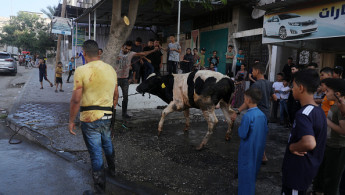One dead, 135 injured during Eid public livestock slaughtering practices in Gaza, Hamas vows to restrict ritual next year
A Palestinian was killed and at least 135 others were injured during livestock slaughtering operations during Eid al-Adha in the besieged Gaza Strip, according to medical sources.
"Abdel Raouf Safi, a 23-year-old young man from Khan Yunis in the southern Gaza Strip, died of a head injury while unloading a calf from a truck to slaughter it," the medical sources told The New Arab.
Safi was transferred to Nasser Hospital in critical condition due to the injury, and the doctors unsuccessfully attempted to save his life in the operating room, the sources added.
For years, the coastal enclave recorded injuries and/or deaths resulting from the low safety involved during slaughtering operations for major holidays, particularly Eid al-Adha. Most injures occur as livestock attempt to escape or are not bounded properly.
Thousands of Gazan expats celebrate Eid al-Adha with families over a decade aparthttps://t.co/QZRCSBaYM8
— The New Arab (@The_NewArab) July 11, 2022
Locals posted some videos documenting the slaughter of livestock in public streets, a practice that is criticised by the majority of the population.
Jalal Safi, a Rafah-based resident, expressed his anger at what described as the "inhumane treatment" of livestock, such as chaining, beating, and stabbing them several times prior to their slaughter.
"It is supposed that we slaughter livestock in order to get closer to Allah (..) but that does not mean that we have to torture animals because that is forbidden in our Islamic rules," the 36-year-old father of three said to The New Arab.
Islam Shehadeh, a resident of Gaza City, decided to slaughter the Eid sheep in one of the municipal slaughterhouses and prevented his children from attending the slaughter.
"I don't know why the children gather to watch the slaughter. I think that this encourages children to be violent, especially if they are used to seeing blood easily," the 40-year-old teacher said to The New Arab.
Shehadeh condemned celebrating Eid al-Adha through festive manifestations of the "inhumane" slaughter of livestock.
"When we were children, we used to celebrate Eid after wearing new clothes and eating sweets (...) We did not attend random slaughter operations, which negatively affected the psychological state of the person," the father of two argued.
Both Safi and Shehadeh called on the Hamas-run local authorities to adopt laws and procedures that limit allowing sacrifices to be slaughtered in public places.
"They (local authorities) should allow the people to slaughter only the sheep at homes only. But calves must be slaughtered in municipal slaughterhouses to avoid all the negative consequences of slaughtering operations in public places," they both remarked.
Palestinians celebrate Eid al-Adha amid Israeli occupation restrictionshttps://t.co/Xcgw5aVyW3
— The Inside- Palestine (@TInsidePal) July 9, 2022
For his part, Yasser Hassouna, an official in the Hamas-run Ministry of Local Government, confirmed that his ministry submitted a request to the Ministry of Awqaf to obtain a legal fatwa on the process of slaughtering sacrificial animals in private and public places in a religiously appropriate manner and in the public interest.
"Based on the fatwa, the ministry will have procedures to follow up on the situation in Gaza, and control the slaughtering operations," Hassouna told The New Arab.
This year, the Gaza Municipality has allocated four slaughterhouse sites, which adhere to the conditions and standards of safety and security, according to Hosni Muhanna, Public Relations Officer in the municipality.
However, Muhanna says, people prefer to slaughter their livestock in public places even if it is against Islamic law to slaughter and violate animal rights.
Next year, he explains, we will adopt a plan to restrict this practice from expanding in the Gaza Strip.
The Ministry of Agriculture had talked about the availability of about 17,000 head of calves and 22,000 head of sheep in the Gaza Strip, which are sufficient for the needs of citizens.







 Follow the Middle East's top stories in English at The New Arab on Google News
Follow the Middle East's top stories in English at The New Arab on Google News
![The UAE is widely suspected of arming the RSF militia [Getty]](/sites/default/files/styles/image_330x185/public/2024-11/GettyImages-472529908.jpg?h=69f2b9d0&itok=Yauw3YTG)
![Netanyahu furiously denounced the ICC [Getty]](/sites/default/files/styles/image_330x185/public/2024-11/GettyImages-2169352575.jpg?h=199d8c1f&itok=-vRiruf5)
![Both Hamas and the Palestinian Authority welcomed the ICC arrest warrants [Getty]](/sites/default/files/styles/image_330x185/public/2024-11/GettyImages-2178351173.jpg?h=199d8c1f&itok=TV858iVg)